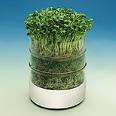 The concept of organic farming is to demonstrate the effectiveness of
low cost agriculture- there by increasing the net earnings from successive
crops and of course the tremendous nutritional and health accruing from this
form of farming. A living soil is the basic of organic farming. A live healthy
soil with proper cropping patterns, crop residue management and effective crop
rotation can sustain optimum productivity over the years, without any loss in
fertility. Organic farming envisages a comprehensive management approach to improve
soil health, the ecosystem of the region & the quality of produce. A living soil can
be maintained by continuous in corporation of crop & weed biomass, use of animal dung.
urine based manures, compost (Fym, NADEP, vermicompost), biofertilizers, bioenhancers,
special liquid formulations (vermiwash) etc. during a crop rotation. As a thumb rule,
crop residues should be returned to the plot, directly or indirectly.
The concept of organic farming is to demonstrate the effectiveness of
low cost agriculture- there by increasing the net earnings from successive
crops and of course the tremendous nutritional and health accruing from this
form of farming. A living soil is the basic of organic farming. A live healthy
soil with proper cropping patterns, crop residue management and effective crop
rotation can sustain optimum productivity over the years, without any loss in
fertility. Organic farming envisages a comprehensive management approach to improve
soil health, the ecosystem of the region & the quality of produce. A living soil can
be maintained by continuous in corporation of crop & weed biomass, use of animal dung.
urine based manures, compost (Fym, NADEP, vermicompost), biofertilizers, bioenhancers,
special liquid formulations (vermiwash) etc. during a crop rotation. As a thumb rule,
crop residues should be returned to the plot, directly or indirectly.
It was revealed that there is a considerable support from the farmers community
& NGOs throughout the State. demanding more trainings for creating awareness of
organic farming. In has been observed that organic farming is badly needed by small
land holder farmers who constitute 85% of the farmers’ community. They are resource
poor, having no capacity to access precise organic methods of farming and give up
prevailing chemical farming. Agriculture Department & SAU’s are strongly advocating
Package of Cultivation Practices based on chemicals which lead farmers to indebtedness.
Keeping this view in mind. MOFF proposes to take up extensive organic training programmes
in almost all the districts of Maharashtra State so that awareness can be created amongst
not only farmers but also the consumers who are ignorantly consuming chemical residues
of fertilizers & pesticides along with food, vegetable & fruits.
Subjects of Training Programme :-
1. Basic Principles of Sustainable Agriculture
2. National & International scope for organic farming.
3. Importance of indigenous seeds & seed banks.
4. Genetically Modified crops & their impact on Agriculture environment , livestock and human health.
5. Seed / seed material (sets , seedling, sapplings, cuttings, rhizomes ) culturing - (Theory & Practical)
6. Nutrient Management Practices in organic crop cultivation
1. Compost, NADEP - (Theory & Practical)
2. Biofertilizers - (Theory & Practical)
3. Vermicomposting - (Theory & Practical)
4. Biodynamic - (Theory & Practical)
5. Beejamrut & Jeevamrut - (Theory & Practical)
6. Panchagavya (Theory & Practical)
7. Tricho composting - (Theory & Practical)
8. Liquid Organic Manures
( Saptadhanyankur,
Vermiwash etc.) (Theory & Practical)
7. Pest management Practices
1. Dashparni - (Theory & Practical)
2. Trap crops, pheromone & light traps - ( Theory & Practical)
8. Weed Management Methods
9. Role of Livestock in Organic Agriculture
10. Importance of Participatory Guarantee Scheme for small land holde & other farmers.
11. Procedure of documentation & appraisal of farms.
12. Women’s role in organic farming.
13. SHG Participation in value addition processing & marketing of organic produce.
14. Consumers awareness for organic food consumption.
Salient Features of Trainings :-
1. Lectures of organic experts on all aspects of organic crop cultivation.
2. Practical & demonstrations
3. Farm Visits
4. Participation of female trainees
5. Participation of SHG wherever possible
6. Trainees equipped with Training kit , containing Letter pad, pen, literature, C.D, slogans & Sticker of MOFF membership etc
7. Group discussion & feed back on various aspects of sustainable livelihood.
8. Written examination of trainees at the end of the training
9. Distribution of “Certificate” to trainees.
|